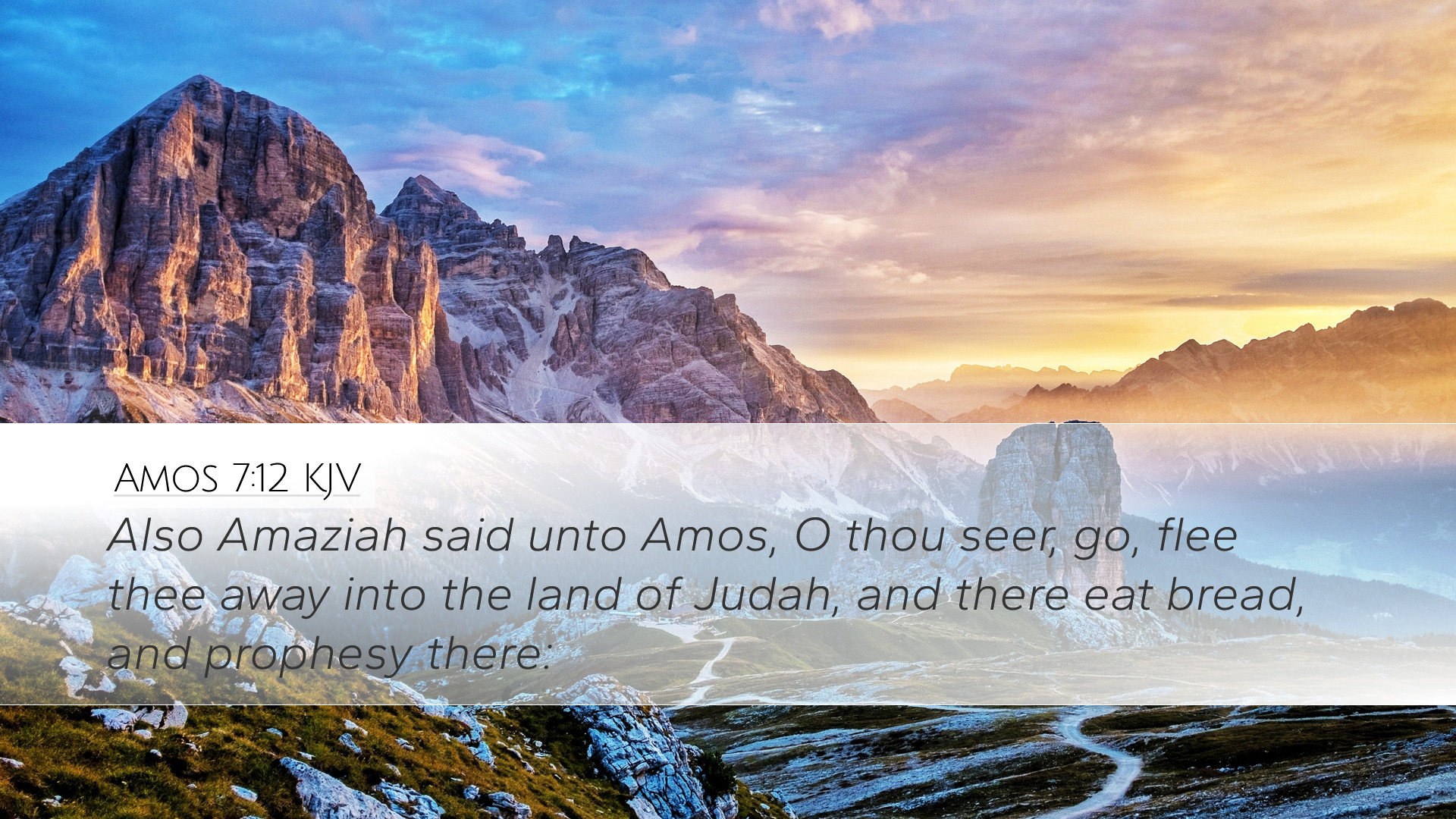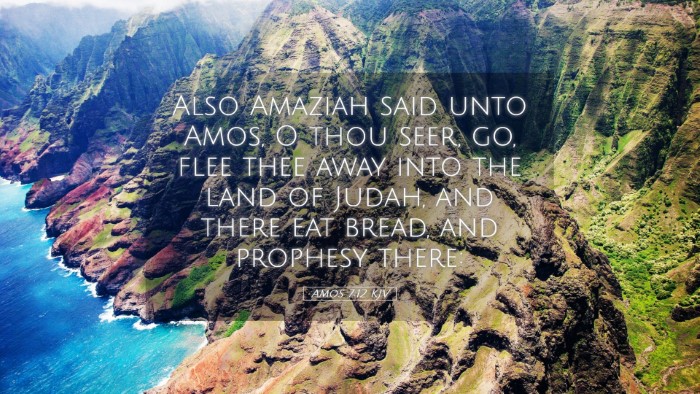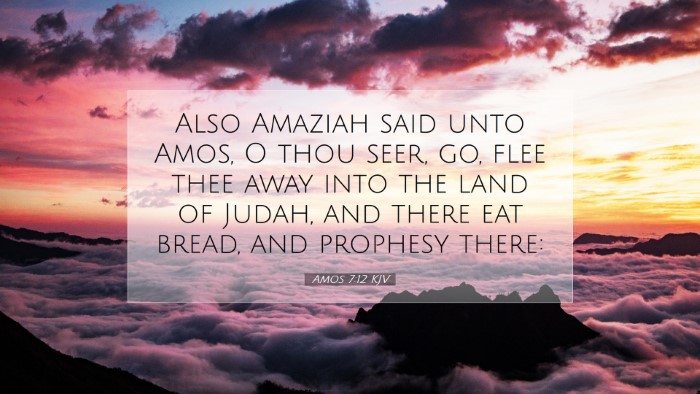Old Testament
Genesis Exodus Leviticus Numbers Deuteronomy Joshua Judges Ruth 1 Samuel 2 Samuel 1 Kings 2 Kings 1 Chronicles 2 Chronicles Ezra Nehemiah Esther Job Psalms Proverbs Ecclesiastes Song of Solomon Isaiah Jeremiah Lamentations Ezekiel Daniel Hosea Joel Amos Obadiah Jonah Micah Nahum Habakkuk Zephaniah Haggai Zechariah MalachiAmos 7:12
Amos 7:12 KJV
Also Amaziah said unto Amos, O thou seer, go, flee thee away into the land of Judah, and there eat bread, and prophesy there:
Amos 7:12 Bible Commentary
Commentary on Amos 7:12
Amos 7:12 (KJV): "Also Amaziah said unto Amos, O thou seer, go, flee thee away into the land of Judah, and there eat bread, and prophesy there."
This powerful verse depicts the confrontation between God’s messenger, Amos, and Amaziah, the priest of Bethel. It encapsulates themes of prophetic calling, rejection, and the tension between God’s message and human authority.
Contextual Background
The book of Amos is situated during a time of relative peace and prosperity in Israel, yet moral decay and social injustice abounded. Amos, a shepherd and fig tree farmer from Tekoa, was called by God to deliver His message of impending judgment upon Israel. His prophecies challenged the complacency of the people and their leaders, provoking strong opposition.
Amaziah’s Response
Amaziah’s command to Amos reveals a significant spiritual and political tension: the prophet's role in society and the reception of God's word. As noted by Matthew Henry, Amaziah’s desire for Amos to leave symbolizes the rejection of God’s truth. Amaziah views Amos as a threat to the established order and is more concerned with his priestly status than with the divine message being proclaimed.
According to Albert Barnes, Amaziah’s insistence that Amos return to Judah reflects the common reaction of the powerful to the uncomfortable truths of prophecy. He wishes to silence the prophet because the message of God threatens his position and authority. This illustrates the broader theme seen throughout scripture where prophets often face hostility from those in power.
The Role of the Prophet
Amos's identity as a “seer” reflects his role as a visionary. Adam Clarke emphasizes that the prophetic task is not merely to provide comfort but to proclaim God’s judgment and call for repentance. This aspect of prophetic ministry draws attention to the often uncomfortable nature of prophetic messages and the challenges faced by those who deliver them.
Amos's designation as “seher” (seer) required him to expose the sinful conditions of society. This calling often puts prophets in direct conflict with societal norms, especially when those norms are contrary to God’s law. The warning given by Amos disrupts the status quo, leading to a clash that is representative of the prophetic experience throughout the Old Testament.
Theological Implications
This interaction between Amos and Amaziah raises vital theological questions regarding the authority of God's word. Matthew Henry proposes that when God sends His messengers, it is not just the individual's message being rejected but God Himself. This underscores the grave implications of dismissing divine warnings.
Albert Barnes summarizes the importance of the prophetic voice in the nation, stating that true prophets are never welcomed in their own land, often resulting in their exile or persecution. This reflects a recurring theme in the history of Israel and anticipates the rejection of Jesus by His own people, a point that brings a New Testament perspective into the discussion.
Furthermore, the idea that prophets are called to speak uncomfortable truths leads to a reflection on the responsibilities of modern pastors and church leaders. Adam Clarke emphasizes the need for courage in leadership, urging contemporary leaders to remain true to God's calling, even in the face of opposition or desire for silence.
Call to Ministry
Amos's experience serves as an important model for all who are involved in ministry. The directive from Amaziah to "go, flee thee away into the land of Judah" serves as a stark reminder that following God’s call may result in alienation from one’s community or even authority.
- Courage to Stand Alone: Those in ministry must often stand firm despite the pressures to conform to societal expectations or institutional politics.
- Commitment to the Message: Remaining devoted to the truth of God’s Word is paramount, echoing the sentiments expressed by both Henry and Barnes that the integrity of God’s message must not be compromised for acceptance.
- Awareness of Opposition: The potential for opposition should not deter ministerial work but instead serve as a catalyst for bold proclamation of God’s truths.
Conclusion
Amos 7:12 stands as a poignant reminder of the tension inherent in prophetic ministry. The call to proclaim God’s message often comes with the risk of rejection and isolation. Yet, this passage also heralds the necessity of such voices in the world—a divine calling that demands faithfulness, resilience, and integrity.
For pastors, students, theologians, and biblical scholars, the lessons drawn from this verse encourage a deeper understanding of the role of prophets in scripture and the nature of God’s communication through chosen individuals. It urges readers to acknowledge and respect the weight of prophetic words, for they are not merely alternatives to human wisdom but the very voice of God.


